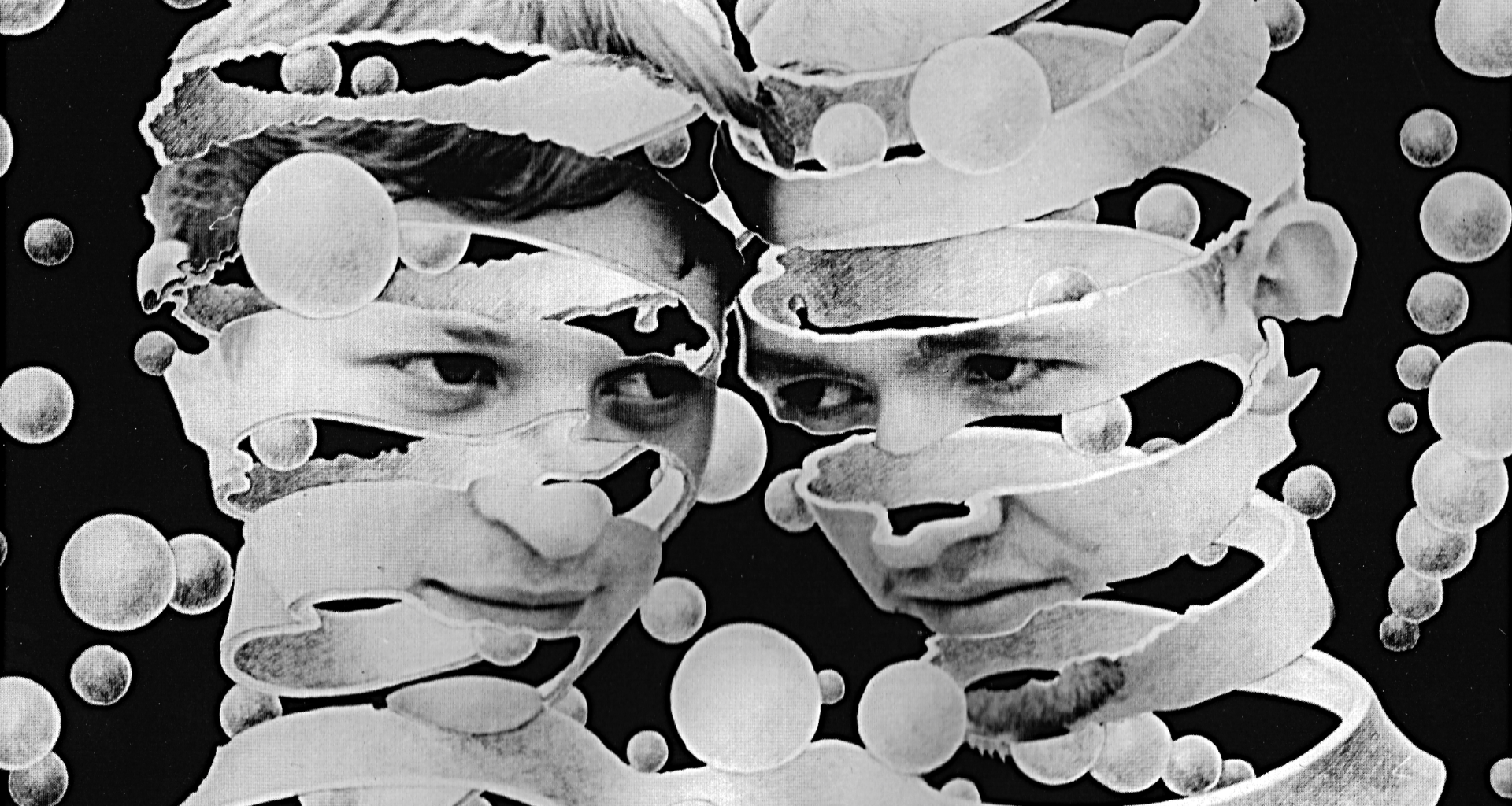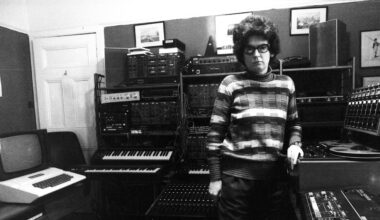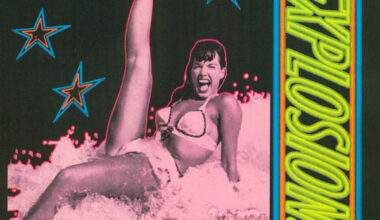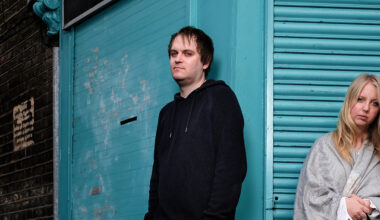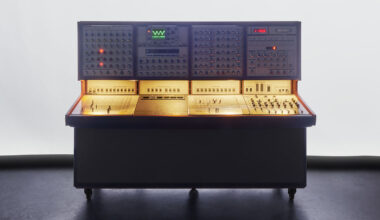Ambient kings Global Communication have curated a new boxset of their most celebrated work, including their classic ’76:14’ album and their legendary Chapterhouse remixes. Tom Middleton and Mark Pritchard give us the lowdown
There’s one piece of sampled spoken word – in this case, from the eponymous hero of the film ‘Ferris Bueller’s Day Off’ – that comes closer than any other to summing up the philosophy of Global Communication.
“Life moves pretty fast,” says Bueller at the start of ‘Links’, Tom Middleton and Mark Pritchard’s 1995 ambient jungle anthem under their very apt Chameleon alias. “If you don’t stop and look around once in a while, you could miss it.”
Time has indeed moved pretty fast since then. It’s 25 years since Middleton and Pritchard were at the height of their collaborative powers. Taking on a dazzling array of different names – Chameleon, Link, Reload, Jedi Knights – they were responsible for a hugely prolific outpouring of diverse sounds, from hardcore rave and jungle to house, techno and electro. But whatever their choice of genre, their hallmark sweet melodies and a love of the funk were always at its heart. This and a reflective atmosphere that seemed to echo Bueller’s cautionary words down to the ground.
The pair’s most celebrated moniker by far was Global Communication, the vehicle for their highly distinctive ambient work. It’s this side of their multi-faceted talent that Warp have revisited with ‘Transmissions’, an extensive boxset of GC’s mid-90s glory days. The collection brings together their now legendary ‘76:14’ album, their wholesale remix of shoegaze band Chapterhouse’s ‘Blood Music’ LP, and a curated selection of singles and reworkings. They’re all releases that were lauded at the time and have since become sought-after items, some of them fetching three-figure sums on the second-hand market.
Tom Middleton and Mark Pritchard pay tribute to Warp for taking the time to help them create a package that does justice to their Global Communication work. The 1990s DAT tapes were used in the remastering, providing an opportunity to reinstate the natural sound of recordings that were made at the height of the trend for loudness. As well as sonic curation, the boxset also amasses a wealth of archive material, both musical and from those who have been touched by the music’s existence.
“We invited people’s feedback by putting a PO box number on the back of the original album saying, ‘Send us your thoughts’,” explains Middleton. “We wanted art, poetry, whatever it made them feel, and we were inundated. It was like Tony Hart’s gallery! We had a lot of pictures and some deeply personal letters as well. There was a soldier in Afghanistan who was listening to the cassette version and he wrote to us saying, ‘I’m looking up at the stars. Thank you for this music that’s helping me feel grounded’.”
Middleton, who has recently widened his skills into the world of music therapy, sees this as affirmation of what the duo were aiming for at the time.
“It compounds the idea that music has a higher function than mere entertainment,” he says.
For Pritchard, who has lived in Sydney, Australia, for the past 14 years, the reissues have been an interesting exercise in viewing GC’s classic early catalogue in a new light and with the benefit of 25 years of hindsight.
“I actually thought some of it was a bit dated the last time I listened,” he says, particularly of the Chapterhouse remixes, which were released on the standalone album ‘Pentamerous Metamorphosis’. “But when I went back to it all this time, it made me smile. I could feel the naivety there – the equipment we were using, the digital-sounding pianos – but it has stood the test.”
The chance to set the record straight by remastering the tracks as they’d been conceived in the studio was highly satisfying. Pritchard points to the ‘Beta Phase’ remix of Chapterhouse’s ‘Don’t Look Now’ as one that really comes to life in the freshly mastered version.
“It’s got a Mellotron flute in it and it’s quite peaceful,” he says. “But when the bass came in, I just laughed. It was way too big. If it had been more balanced, it might have sounded a bit new age, but because the SH-101 bass is kind of ridiculous, it draws the track into a different atmosphere. It was a mistake in a way, but I like it even more now. It kind of makes it, gives it an attitude.”
Middleton agrees, describing the first versions as taking a “smashed by a brick wall” approach to mastering.
“We have finally got masters that breathe again,” he adds. “What you hear is a proper reproduction of what we were feeling in the studio.”
Pritchard still finds it amazing that Chapterhouse gave them the whole of their ‘Blood Music’ album to be reworked, with no restrictions or directions whatsoever.
“Andy Sherriff from the band had picked up some of our early releases and really liked the Global Communication stuff,” says Pritchard. “He approached us and said, ‘Would you like to remix our entire album?’. Looking back, it was quite a mad thing to do, but he trusted us to do it. He was like, ‘Do whatever you feel’. We thought, ‘Oh, this is interesting’. We deliberately didn’t listen to the original tracks that much. We went through the DAT tapes and found the parts we liked, maybe just a guitar effect that we’d pitch down an octave and sample and use as a texture, or just a backing vocal.”
Reviewers at the time joked that Chapterhouse must have been weeping into their effects pedals at how little of ‘Blood Music’ had been left intact, but Pritchard maintains they loved the results. Indeed, both Andy Sherriff and Stephen Patman, the band’s other lynchpin, would go on to visit GC’s rural headquarters in Crewkerne, Somerset, to perform on ‘5.23’ (also known as ‘Maiden Voyage’), which would become part of ‘76:14’, GC’s debut album proper.
The location of that studio, in a room at Pritchard’s grandparents’ house on the edge of a small rural town – “at the end of a lane, right before it became fields” – was an influence that everybody who visited them found too obvious not to mention at the time. When discussing the record’s deep ambient flavour, the duo point to the fact that the studio looked out onto grazing sheep and cows, although Middleton adds that they also recorded mechanical sounds at the factory where his mother worked to create the rhythm tracks of their more industrial techno Reload pieces.
“When I look back now, I can hear these influences,” he admits. “The things that we were listening to, and even being subliminally exposed to, were clearly being utilised in the studio environment.”
As well as those pastoral motivations, the studio had another important purpose too. It kept them surrounded by normality.
“My nan was living with us,” recalls Pritchard. “It was actually my nan and grandad’s house and we all moved in there when my grandad passed away. The family converted one of the rooms into a soundproofed studio, which helped me out. I had somewhere to work and it didn’t cost me much. I was a chef before that, but my parents could see how passionate I was about music. My dad said, ‘If you can make this work, if you can survive on something that’s your passion, just go for it’.”
Before meeting Middleton, Pritchard had a Top 10 success with a version of the theme tune from the children’s TV show ‘Roobarb And Custard’ under the name Shaft. But the experience, from the business side to appearing on ‘Top Of The Pops’ alongside The Pogues and Right Said Fred, was one he found bewildering.
“It was an accidental hit that happened out of nowhere,” he notes. “I was just a West Country boy who knew nothing of the music industry. When I saw how it all worked, I thought, ‘Well, I don’t want to have anything to do with that, so I’ll get on with the other stuff I’m doing’. It wasn’t terrible, but I never really wanted to have that fame thing. I never really wanted to even have any pictures taken.”
The connection between Middleton and Pritchard was one of musical common ground.
“I saw Mark DJing in Taunton, playing techno and house, and I went up after the gig and introduced myself,” remembers Middleton. “I invited him up to my student accommodation to hear my C90 mix tapes of unreleased Aphex Twin tracks. We realised we were on the same wavelength and pretty soon we’d set up our Evolution label.”
The pair’s contrasting personalities – Middleton outgoing and gregarious, Pritchard more reserved – definitely combined to make something unique. Pritchard says their studio work happened very naturally.
“We didn’t have many arguments about what was going on. Tom would programme the synths and I would do more of the arrangements and sequencing, but we would encourage each other to take over and switch it up at times. The reason ‘76:14’ and the Chapterhouse remixes worked especially well was that Tom was into melody and he could push things into more accessible territory, whereas I would try to pull us into a weirder, darker place.”
For Middleton, who had spent time watching the fledgling Aphex Twin in the studio, it was another chance to learn and he caught on fast when it came to production.
“I’m incredibly lucky,” he reflects. “Richard James showed me how to make music and then my next tutor was Mark. It was brilliant. My introduction to sound design was seeing Richard banging bits of metal and boxes together, recording them to tape, and then turning them into percussion. Or literally taking the lid off an SH-101 monosynth and extending the parameter of the frequency to ultrasonic and infrasonic, beyond the realms of human hearing into brainwave territory.
“Watching the genius mind of Richard James at work gave me a sense of curiosity and a feeling that anything is possible. Neither Mark or I were trained engineers, we were freestyling and making a lot of mistakes, but having good ears and an innate improvisational jazz ability really helped. I think with Mark being a drummer and me being a guitarist, it was a great combination. We were both into the same music and both had technical ability, but in different areas.”
With Global Communication’s landmark ‘76:14’, Middleton and Pritchard launched into a super-productive spurt of creativity. They recorded as Chameleon for LTJ Bukem’s Good Looking label, kicked off the short-lived but much-loved electro label Clear as Jedi Knights, and saw their more techno-themed tracks collected on a Warp compilation, ‘The Theory Of Evolution’.
“It was a fascinating time,” says Pritchard. “One weekend we’d be going to Bristol to listen to Todd Terry, the next weekend it’d be LTJ Bukem in Bournemouth, and then it’d be Plymouth to hear Joey Beltram. We opened ourselves to as many different sounds and styles and genres as possible because we loved music. We weren’t allied with one particular scene, which you can tell from the diversity of the records we made.”
On top of that, there were remixes for everyone from Aphex to Yes frontman Jon Anderson, which made curating the final part of the ‘Transmissions’ boxset a tough call.
“Fans have been asking why we didn’t put this or that on it,” says Middleton. “And although it would have been brilliant to do a complete companion of remixes, the licensing made it impossible.”
In the end, the set contains tracks from ‘The Keongaku EP’ (the very first GC release), remixes of The Grid and Sensorama (long-time in-house favourites), and a previously unavailable version of ‘5:23’ from ‘76:14’ by Nottingham producer Matt Cutler, aka Lone.
“I’ve always liked Lone’s stuff,” says Pritchard. “You can hear elements of the late 80s and early 90s in his music, but he updates it really well.”
The final piece in the jigsaw is GC’s 1996 deep house single, ‘The Way’ coupled with ‘The Deep’, which saw their meditational sound transferred to the dancefloor. The record was hailed as a massive triumph at the time and adopted by big-name DJs who had previously never touched their material. In many ways, it also heralded a change in the duo’s relationship. The roots of the shift went back to April 1994, just weeks before the release of ‘76:14’, when Pritchard had been struck down with severe food poisoning on a trip to Russia as part of the Britronica Festival, where they’d performed alongside Aphex Twin, Ultramarine, Autechre and Alex Paterson.
“It wiped me out for two or three years,” he admits. “It was pretty bad initially, but it turned into me having panic attacks. I didn’t go out for at least a year-and-a-half. That’s why you didn’t see me through that period. I was just making music in my studio.”
With Pritchard rarely making live appearances, although one occasion saw him swinging a light sabre behind the mixer as a Jedi Knight at The Blue Note in Hoxton Square, it was generally down to Middleton to become the public face of GC, taking up more of the live and DJ duties. So it was perhaps only natural that his tastes would turn to more club-oriented material.
“It wasn’t a break-up where we said, ‘We’re not working together’, it just sort of drifted,” says Pritchard. “I remember one meeting with a management company who told us, ‘You need to leave this other stuff and do house music, you’ll be massive, you’ll be really famous, your career will take off’. They were probably right, but I was so far away from wanting to do that. I sat there thinking, ‘There’s no way I’m going to be managed by you’.”
Mark Pritchard stayed true to his word. His post-Global Communication career has taken in everything from collaborating with Radiohead frontman Thom Yorke and grime godfather Wiley to his Harmonic 313 hip hop project. Tom Middleton is meanwhile perhaps best known for his house DJ sets and productions such as The Mod Wheel and Cosmos.
Middleton has also maintained an ambient/classical project called AMBA and in recent years has become interested in the therapeutic possibilities of music. He’s looked increasingly beyond the instinctive towards the science of how it can help with anxiety, sleep, focus and more. He’s about to embark on a psychology research project at Goldsmiths, University of London, and he’s been working on sound design and content curation for the hugely popular ‘Calm’ app.
“Millennials are starting to look at music as being something more than entertainment, which I find fascinating,” he says. “I’m very excited about how a new generation of producers could have careers making music that helps human beings but perhaps isn’t released in the traditional way.”
As for Pritchard, he’s found that the past is, as the saying goes, a foreign country that he’s been happy to visit, but not for too long.
“There are lots of good memories,” he says. “You get pulled back, remembering times and people, but there’s also this weird feeling of not wanting to get carried away by what we’d done in the past. I always want to focus on making new music.”
‘Transmissions’ is out now on Evolution/Warp
